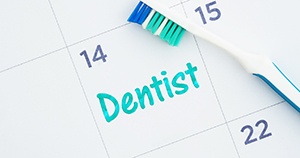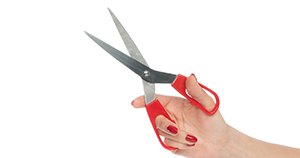Why Choose Meriden Dental Group for Emergency Dental Care?
- Team of Talented & Compassionate Dentists
- Same-Day Appointments for Emergency Patients
- Multiple Options to Make Emergency Dental Care Affordable
What to Do in a Dental Emergency

A dental emergency can strike anywhere at any time, so it’s important to be prepared. Should you or a loved one experience one of these scary situations, keep these simple steps in mind:
- Call us as soon as possible: When you call us, we’ll help evaluate your situation and give you instructions on what to do next. We’ll also schedule you an emergency appointment, typically on the same day that you call us.
- Get an emergency dental exam: As soon as you reach our office, your Meriden emergency dentist will see you right away for an examination. They’ll work quickly to learn more about your emergency and get you out of any pressing or severe pain.
- Review the findings and make a plan: We’ll review our findings with you and discuss which treatment options we recommend, including the estimated length and price. Together, we’ll work with you to create a treatment plan.
- Get the fast, professional emergency dental care you need: Whether you need a filling, dental crown, root canal, or something else entirely, our team will get to work right away to preserve your teeth, repair your smile, and alleviate your pain.
The Most Common Dental Emergencies
Some dental emergencies are the result of an injury or accident, like getting hit in the face with a ball or elbow. Other emergencies develop slowly over a long period of poor oral hygiene or bad chewing habits, like a painful toothache stemming from an infection. Whatever situation you’re facing, our team here at Meriden Dental Group is well-equipped to address your situation and get your oral health back on track. Even if you’re not sure if you need urgent dental care, give us a call so we can help you decide what to do next. Below, you’ll find some of the most common dental emergencies we treat.
How to Prevent Dental Emergencies

We are ready to serve as your emergency dental office in Meriden. However, we are sure that you would prefer to avoid having to deal with a dental emergency in the first place. To that end, we have prepared a brief list of steps you can take to reduce your risk of suffering an urgent oral health problem.
Attend Regular Checkups

All adults should visit their dentist at least twice a year for a cleaning and checkup. At these appointments, we can identify most dental problems while they are still in their early stages, before they cause you pain and before they require emergency treatment. We will also thoroughly clean your teeth, removing plaque and tartar that, if left unaddressed, could lead to decay later on. If you have any questions about how to care for your smile, these appointments are the perfect time to ask.
Maintain Good Oral Hygiene Habits at Home

Maintaining a clean mouth can do much to prevent bacteria from causing gum disease and cavities. Here are a few basic oral hygiene tips:
- Brush twice a day. Be sure to clean the area along the gumline as well as the backs of your teeth.
- Floss daily. Flossing cleans the tight areas between teeth that your toothbrush cannot reach. If flossing is difficult for you, ask your hygienist how you can make it into a habit.
Watch What You Eat

When sugar interacts with bacteria in the mouth, plaque, decay, and gum disease may soon follow. That is why it is best to enjoy sweet treats only in moderation. It is also wise to avoid overindulging in acidic foods and beverages, like sports drinks, which can weaken your enamel. Instead, try to center your eating habits around foods that support oral health, like fruits, vegetables, and calcium-rich items.
Wear a Mouthguard

Do you like to play sports? Even if your activity of choice is considered non-contact, it would still be wise to wear a mouthguard. Not only can a custom mouthguard protect your teeth and gums, but it can also lower your risk of concussion. If you grind your teeth at night, you may need a different type of mouthguard, which can place a barrier between your upper and lower teeth to prevent them from harming one another.
Do Not Use Your Teeth as a Tool

Human teeth are incredibly strong, so it might be tempting to use yours as a tool to do things like open packages, trim your fingernails, or get the tags off of new clothing. However, doing so is a bad idea if you want to prevent dental emergencies in Meriden. If they are exposed to too much force, teeth can easily chip and break. It is better to use tools that are designed for the task at hand, such as scissors or a knife.
Understanding the Cost of Dental Emergencies

The cost of emergency dentistry in Meriden is impossible to predict for any specific case. We will only be able to provide you with a price estimate when you visit us for your appointment. We strive to be transparent with our financial policies, and we have provisions to help patients afford their care. For example, we are happy to file insurance claims, and we accept financing through CareCredit. Do not let concerns about cost hold you back from seeking care — the sooner you are treated, the less your procedure is likely to cost!
Every Dental Emergency Is Different

There are several variables that determine the cost of emergency dental care. The nature of your dental problem, as well as its extent, will determine which treatment we recommend. Generally speaking, simple treatments like fillings and prescription oral hygiene products, cost less than procedures like root canal therapy and surgical extractions. In some cases, there might be more than one treatment that could address the problem. If that is true of your situation, we will make sure you understand the pros, cons, and cost of each option before you make a decision about how to move forward.
Does Dental Insurance Cover Dental Emergencies?

Most dental insurance plans cover one exam by an emergency dentist in Meriden each year. They also commonly cover procedures that may be part of urgent care. For example, they might pay for 80% of the cost of fillings and 50% of the cost of crowns, up to the policy’s annual maximum. Our team will verify your insurance coverage and help you file all necessary claims. You can make the process as smooth as possible by having your policy information available when you arrive for your appointment.
Other Options for Making Dental Emergencies Affordable

In addition to helping you with insurance, we offer a few provisions that may make it easier for you to manage the cost of emergency dental care:
- Essential Dental Plan. This discount plan can reduce the cost of virtually all the services we provide in our office. It is easy to sign up, and unlike dental insurance, you will not have to go through a waiting period before you are eligible to take full advantage of your benefits.
- CareCredit is a third-party lender that offers low-interest and no-interest payment plans for dental and medical services. The application process is fast, and most patients are approved for credit. You may be able to choose from several different payment plans, so you can settle on the one that works best with your personal budget.
Taking Care of Your Smile Can Save You Money

Many dental emergencies are the result of small dental problems that are allowed to progress into severe, painful issues. For example, you might notice a little sensitivity in a tooth, possibly caused by a cavity, but choose to ignore it. What could have been treated with a simple (and inexpensive) filling may progress into major decay, which could require root canal therapy and a crown (a much more costly procedure). Seeking treatment as soon as you suspect something is wrong with your teeth is the frugal course of action.
Also, keep in mind that most insurance policies cover preventive care at 100%. Regularly attending cleanings and checkups can allow us to monitor your oral health, reduce your risk of future problems, and identify developing problems before they become serious.
Dental Emergency FAQs

Our team is ready to serve as your emergency dentist in Meriden. Hopefully, you never have to face an urgent oral health problem, but if you do, you should know the basics of how to handle the situation. That is why we have compiled a list of answers to some common questions about emergency dentistry. Hopefully, what you discover will empower you to take excellent care of your teeth when they are most in need. If you would like further information about anything you read, feel free to give us a call. We look forward to speaking with you.
Will My Toothache Go Away on Its Own?
Teeth are incapable of healing themselves, so it is unlikely that your toothache will disappear without professional treatment. However, there are exceptions to the rule. For example, if the pain is emanating from somewhere near a tooth, instead of the tooth itself, the problem may resolve on its own. A toothache may also disappear if the nerve inside the tooth dies, meaning it can no longer send pain signals to the brain. That is not a good thing. The infection that caused the toothache in the first place may still be present. It could continue to spread, affecting nearby tissues and eventually causing systemic illness. Really, any time a tooth is in pain, you should see your dentist promptly.
Should I Visit the Emergency Room First for Dental Emergencies?
Most hospital emergency rooms are not able to address a dental emergency in Meriden. Their staff may not have the appropriate training, and they are unlikely to have all the necessary equipment to handle your problem. In most cases, you should see your dentist first for any issues related to your oral health. However, there are some exceptions. If you have a broken or dislocated jaw, uncontrolled bleeding, or any life-threatening symptoms, you should certainly visit the hospital or call 911. Later, after the ER team provides primary care, you can visit us for follow-up treatment.
What Does Throbbing Tooth Pain Mean?
In many cases, throbbing tooth pain points to an infection within the tooth. When the infection causes inflammation, it irritates the tooth’s nerve, which then sends powerful pain signals to your brain. Something similar can happen when a deep cavity or crack allows outside stimuli to irritate the tooth’s nerve. In other cases, throbbing tooth pain is due to chronic bruxism (grinding and clenching). Often, bruxism occurs at night, so if your teeth tend to throb most in the morning, bruxism might be to blame.
Should Knocked-Out Teeth Be Placed in Water?
It is important to keep knocked-out teeth moist. However, placing them in water is not advisable. The water could damage the tooth’s root surface cells, decreasing the chances that the tooth can be replanted into its original position. Instead, it is best to store the tooth in your mouth — preferably in its socket, but you can also place it between your cheek and gums. Alternatively, you can store it in milk or in a saline solution that is part of a tooth preservation kit.
More to Explore
Need a Checkup or Cleaning? Missing One or More Teeth? Looking to Improve Your Smile? Advanced Services View Our Services
You are being directed to a secure payment site.
Redirecting in seconds...
